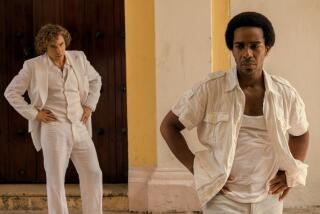MOVIE REVIEW : ‘Nixon,’ the Enigma : Oliver Stone Tries to Get Behind the Many Masks of the President
- Share via
Richard Nixon reincarnated and reinvented himself so often there seemed to be a new Nixon for every phase of the moon. So it is fitting that “Nixon,” the latest interpretation of our most resilient president, is presented by, of all things, a new Oliver Stone.
Mostly (though not completely) gone is the disturbing, lunatic Oliver Stone, the bad-boy writer-director who infuriated the political establishment with “JFK” and outraged sensibilities nationwide with “Natural Born Killers.” He’s been replaced by a filmmaker very much on his best behavior, a thorough researcher who consulted 80 books and published a heavily footnoted screenplay. If Quentin Tarantino made a film in the style of Sir Richard Attenborough, the surprise could not be greater.
And “Nixon” is in many ways an impressive, well-crafted piece of work. With name actors in more than 20 parts, it is as intelligently cast (by Billy Hopkins, Heidi Levitt and Mary Vernieu) as any movie this year, and includes at least one exceptional performance, though not the one you’re expecting.
Collaborating once again with cinematographer Robert Richardson and editors Hank Corwin and Brian Berdan, Stone has not completely abandoned the visual fireworks, the odd angles and the multiple looks that have characterized his work.
But even though Stone could, and often did, drive everyone crazy with his exhaustive excesses, that doesn’t mean that restraint necessarily suits him. This “Nixon,” serious and filled with good intentions though it is, lacks the one element Stone movies have rarely done without before, and that is pulsating excitement. It is possible to nod off during “Nixon” and, for an Oliver Stone picture, that is a first.
Partly this is because considerable chunks of the film are taken up with Nixon in meetings and strategy sessions, an inside-baseball approach that will appeal largely to political junkies. So much time is spent watching Nixon being Nixon (as opposed to showing how he became Nixon) that the drama is hard to find.
Stone and co-scripters Stephen J. Rivele and Christopher Wilkinson see Nixon as the kind of tragic figure that would justify the celebrated quote from Matthew that begins the film, “What shall it profit a man, if he shall gain the whole world, and lose his own soul?”
“Nixon’s” Nixon is a seriously troubled individual, given to self-pity and tortured by insecurities. The son of a father who professed that “struggle, not victory, gives life meaning,” he believed in America and accomplished much, but was not strong enough to overcome his personal demons and ended up cast into a slough of alcoholic despond by the Watergate fiasco.
Whether the president actually was a problem drinker is one of the key areas where historians have already begun to quibble with Stone, the other being Nixon’s involvement with Track 2, an abortive CIA anti-Castro plot the picture connects with (surprise) the Kennedy assassination. But unlike “JFK,” what’s on screen is so non-incendiary by nature, no one besides specialists and Nixon’s immediate family are likely to be much troubled by its lapses.
It is Nixon himself who presents a more serious difficulty. Despite some time spent showing his formative years in Whittier, it is possible to watch this entire three-hour-and-10-minute movie and not feel you understand this president any better than when you came in. His masks, whatever they might have been, were simply on too tight; he remains opaque and unknowable despite the best efforts of the filmmakers to analyze him.
And, heroic and impressive though it is in some ways, Anthony Hopkins’ performance in the title role does not satisfy. Part of the problem is physical, the scrunched-over Hunchback of Notre Dame way this Nixon walks. And the man’s voice is so familiar that Hopkins’ choice of accent, defensible though it may be, inevitably feels wrong. All told, these touches help turn Nixon into a kind of grotesque, lacking in traits that would make his leadership of anything more important than a Kiwanis Club believable.
“Nixon” starts, like a horror movie, on a dark and stormy night, with the president prowling around a room of the White House like Dracula in his lair, listening to the secret tape recordings he made in the Oval Office. That triggers the film’s intricate flashbacks-within-flashbacks structure, which by the time it’s over manages to at least touch on all the major milestones of Nixon’s career, including conflicts with Alger Hiss and Helen Gahagan Douglas, the Checkers speech and the Kennedy debates, the bombing of Cambodia and the opening of China.
Back, too, like an unsettling dream, are the dozens of disturbing characters from the Nixon years, from Henry Kissinger (Paul Sorvino) and John Mitchell (E.G. Marshall) to twin terrors H.R. Haldeman (James Woods) and John Ehrlichman (J.T. Walsh). All these roles are well-done, with the actors who find humor in their parts--notably Bob Hoskins as a J. Edgar Hoover who cruises the kitchen help and Madeline Kahn as Martha Mitchell--coming off best.
Easily the most memorable performance in this film, however, is Joan Allen’s exceptional work as Pat Nixon, the loyal wife Nixon liked to call “buddy.” Able to get deeper into her character than anyone else, Allen, a highly regarded stage actress who played the mother in “Searching for Bobby Fischer,” turns every scene she’s in into eye-opener drama. She shows us a more complex, more human Pat Nixon than we imagined, and, in doing so, underlines that the film hasn’t managed to do the same for our 37th president.
* MPAA rating: R, for language. Times guidelines: considerable profanity spoken by the president.
(BEGIN TEXT OF INFOBOX / INFOGRAPHIC)
‘Nixon’
Anthony Hopkins: Richard M. Nixon
Joan Allen: Pat Nixon
Powers Boothe: Alexander Haig
Ed Harris: E. Howard Hunt
Bob Hoskins: J. Edgar Hoover
E.G. Marshall: John Mitchell
David Paymer: Ron Ziegler
David Hyde Pierce: John Dean
Paul Sorvino: Henry Kissinger
Mary Steenburgen: Hannah Nixon
J.T. Walsh: John Ehrlichman
James Woods: H.R. Haldeman
Andrew G. Vajna presents an Illusion Entertainment Group/Cinergi production, released by Hollywood Pictures. Director Oliver Stone. Producers Clayton Townsend, Oliver Stone, Andrew G. Vajna. Screenplay by Stephen J. Rivele, Christopher Wilkinson and Oliver Stone. Cinematographer Robert Richardson. Editors Brian Berdan, Hank Corwin. Costumes Richard Hornung. Music John Williams. Production design Victor Kempster. Art directors Donald Woodruff, Richard F. Mays, Margery Zweizig. Set decorator Merideth Boswell. Running time: 3 hours, 10 minutes.
(Writers Robert Scheer and Christopher Weills Scheer served as project consultants. Robert Scheer is a Los Angeles Times contributing editor.)
* In general release throughout Southern California.
*
* KING MAY BE NEXT: Although he denies serious talks with Warner Bros., Oliver Stone says he’s thinking of doing a film on the Rev. Martin Luther King. F3
More to Read
Only good movies
Get the Indie Focus newsletter, Mark Olsen's weekly guide to the world of cinema.
You may occasionally receive promotional content from the Los Angeles Times.











